Final report for ES16-129
Project Information
The Systems 360° Initiative is a discussion-based Extension program for Alabama beef producers to increase knowledge and application of sustainable land and animal management practices in the Southeast. The Initiative is a collaborative effort by an advisory group consisting of Alabama Cooperative Extension personnel (ACES; specialists and agents), Auburn University College of Agriculture faculty, the Alabama Beef Cattle Improvement Association and state Natural Resources Conservation Service (NRCS) and Farm Service Administration (FSA) personnel. The goals of this project were to: 1) create decisions tools (webinar series, management handbook, and PowerPoint templates) and 2) provide in-classroom training and hands-on demonstrations to educators on the tools and related concepts to minimize environmental and economic risk in beef cattle production systems. These tools address forage, water, herd management, climate, and economic considerations in different eco-regions of the state. In 2016, the Systems 360 advisory group was formed and a needs assessment was conducted to determine a strategic plan for curriculum development. Curriculum development began in fall 2016, and resulted in the release of a series of YouTube videos, individual ag/natural resource publications, a printed beef systems handbook, and a cattle herd management calendar. Grant participants also participated in an ongoing statewide webinar series focused on forage-livestock management on an annual basis that is available at www.alabamabeefsystems.com. In fall 2016, a pilot producer-based discussion group (also known as a working group) was started in the Tennessee Valley region of Alabama to begin delivering components of the curriculum to stakeholders as they were developed. There were 24 producers in this program, which consisted of on-farm learning experiences involving Extension, NRCS, and FSA personnel. This program was completed in spring 2017. Full curriculum development was finalized in fall 2017. Additional technical educators were trained in spring 2018 after the full release of the curriculum, and a statewide effort to promote discussion-based educational training for livestock producers began. Five discussion-based producer working groups were started across the state in fall 2018, and are finishing their program efforts in spring 2019. There are 78 producers who enrolled in discussion groups statewide.
1) Formation of the Systems 360° Advisory Committee: A multidisciplinary Systems 360° Advisory Committee was formed in summer 2016 to develop and deliver a comprehensive curriculum related to improved land resource utilization in Alabama livestock operations. This integrated team consists of ACES personnel (specialists and agents), Auburn University College of Agriculture faculty, USDA NRCS, USDA FSA, Alabama Beef Cattle Improvement Association, and key beef producers. The advisory committee contributed towards this effort in two ways: a) development of educational decision tools and evaluations; b) provide in-service training opportunities to technical personnel statewide.
2) Educational Resource Development: Develop interactive educational resources on soil, water, forage, climate and risk management in livestock operations. Target tools for development include web-based presentation platforms (webinars), as well as reference PowerPoint templates for use in future programming. Materials will be designed for use in future programs by Extension agents, NRCS, FSA, and will later become accessible by end users.
3) Resource Training Programs: Members of the advisory committee provided training programs on Systems 360° curriculum and concepts for use in end-user programming. The target audience for these workshops include Extension agents, NRCS conservationists, FSA field representatives, and regional beef cattle leaders. These trainings will consist of both in-classroom and experiential learning opportunities to illustrate sustainable land management practices in beef production systems based on regional soil, water, forage, climate, and economic considerations.
4) Producer Networks and Resource Implementation: The advisory committee has created an evaluation tool to determine program satisfaction and application of management concepts discussed as part of the Systems 360 Initiative (beginning with the pilot working group in fall 2016/spring 2017). Following technical trainings, Extension agents implemented regional working group programs with producers focused on concepts presented during training events. Selected participants in these programs have been asked to participate in follow-up evaluations to determine long-term impacts beyond the timeframe of the proposed project.
There is a need for agency partnerships to train new and beginning cattle ranchers in improved land management strategies, which will lead to enhanced sustainability of the beef industry within the state.
Effective dissemination of educational materials is built upon knowing:
1) type(s) and form(s) of information needed and
2) the appropriate technology transfer system(s). It is estimated that 70% of US farms and ranches now have access to the internet making this platform a new and viable educational tool (NASS, 2015). Extension educators across the country now use a combination of online decision tools to deliver scholarly information to end users. Of this percentage, roughly 39% are livestock producers that regularly use computers for business (NASS, 2015). Recently, beef cattle Extension programs in the US have successfully used websites and other web-based platforms to provide research-based management information (Parish, 2011; Rusche and Renelt, 2014). Websites, webinars, and e-publications significantly improve the scope and reach of land management resources to end users, especially when awareness of these resources is coupled with one-day training events (Mullenix et al., 2015). There are no curriculum resources that address sustainable land management practices for beef cattle producers using a comprehensive, systems approach in Alabama. Given the success of these resources for other subject matter areas (Majumdar et al., 2015), the Systems 360° Initiative will develop interagency curriculum resources such as webinars, e-publications, and slide sets for cattle producers. The technology transfer system for these resources will be managed using a train-the-trainer approach, followed by their use as supporting material in subsequent hands-on, statewide beef cattle programming led by educators and technical assistance providers (Extension agents, NRCS, and FSA personnel). Survey data from statewide beef cattle programming illustrate the desire for educational programs taught using a combination of in-classroom and experiential learning methodology. Evaluations conducted by the ACES Animal Science and Forage Team in the last two years indicated that participants attending a live educational program prefer hands-on learning opportunities, on-farm or university experiment station tours, and field days to demonstrate recommended production practices. These training workshops provide experiences that equip new and beginning farmers with skills to become successful in the management of livestock operations, providing a positive feedback loop for Extension educators, and assistance agencies such as NRCS and FSA. Improved focus on environmental sustainability through this program may enhance overall economic and social well-being of a growing beef cattle sector within the state by 2020.
Education
This project aims to improve the sustainability of forage-based beef cattle systems in Alabama through the development of technical content focused on improved land resource utilization for various ecological regions of the state and integrate of this delivery system into face-to-face farmer-based discussion groups. Curriculum development has included webinars, YouTube videos, printed publications (individual fact sheets and a handbook), a beef herd management calendar, and excel-based forage budgets for use by 1) Extension agents and 2) beef cattle farmers. This curriculum is housed on the Alabama Beef Systems website as a series of systems-based resources for Extension agents to use to facilitate the formation of a farmer-to-farmer based discussion group in their respective region of Alabama.
Education & Outreach Initiatives
To strategize on curriculum resources to be developed as supporting curriculum for the Systems 360 working groups
There were 8 participants from the collaborators on the grant that participated in this meeting in July 2016. A Qualtrics survey was sent to the group prior to the meeting to determine what educational resources were needed as part of this project. The results of the survey were discussed and a timeline was developed as part of the committee meeting. Needs assessment data suggested that a combination of both print and online materials were needed for the curriculum development phase. A printed handbook, calendar, and publications were created as reference material for discussion groups. The handbook consists of individual publications that are also accessible on www.alabamabeefsystems.com to provide an online form. Information was also integrated into a YouTube video series, and an online forage-livestock webinar series hosted monthly by Alabama Extension specialists and agents.
Survey participants indicated that there was a need for both web-based and printed content on land and animal management strategies for Alabama beef farmers. The main web-based content that the group decided to focus on was webinars and short, YouTube videos to highlight best management practices. Short, printed publications were also an identified need. The group decided to "package" these publications into a short handbook that would be the guiding curriculum piece for farmer-based discussion groups. This would allow technical service providers to still access these as individual publications online, or provide a printed, collective text book to participants in the working groups. An iBook was discussed as another option for extending the reach of this material. However, the committee felt that the web-based archiving of publications would provide as much reach as an iBook for the same cost. Instead, an emphasis was placed on promotion of these products through our collective social media outlets.
To develop educational resources on soil, water, forage, climate and risk management in livestock operations. A series of PowerPoint curriculum for use by Extension agents, webinars, YouTube videos, publications, a management handbook, and herd management calendar were created as supporting curriculum for implementation of Systems working groups.
The following resources were created as part of this grant:
Budget Tools
MediumWeightStockers-WinterAnnuals
Stockers-Drylot1 StockersGrazingFescue StockersOnWinterAnnuals-SupplementalFeed FescueEstablishment2017
OverseededWinterAnnuals2017-18
OverseededWinterAnnuals2017-181
Economics of Beef Management Publication
ANR-2435-Planning-to-Make-a-Cow-Calf-Profit
Climate Resources
PowerPoint Curriculum for Technical Service Providers
Drought-Response-Winter-Feeding-Strategies-for-Beef-Cattle
Heat-Stress-and-Dry-Conditions-When-Managing-Beef-Cattle
Publication
ANR-2437-Climate-Effects-on-Forage-and-Beef-Production
Forage Management Resources
Publications for Differing Ecological Regions of Alabama
ANR-0155-Forage-Systems-for-Central-Alabama
ANR-2431-Forage-Systems-for-Northern-Alabama
ANR-2432-Forage-Systems-for-South-Alabama
PowerPoint Resources for Technical Service Providers
Forage-Systems-for-Alabama-Beef-Producers
Poisonous-Plants-for-Livestock-in-Alabama
General Herd Management Practices Resources
Publications
ANR-0968-A-Beef-Cow-Herd-Planning-Calendar
ANR-2415-Beef-Herd-Management-Strategies
PowerPoints for Use By Technical Service Providers
Beef-Herd-Management-Strategies
Body-Condition-Scoring-Beef-Cattle
Importance-of-a-Controlled-Breeding-Season
Systems Management Resources
Publication
ANR-2284-A-Systems-Approach-to-Beef-Production-Developing-a-Management-Plan
Water Management Resources
Publications
ANR-2381-Drinking-Water-for-Livestock
ANR-2436-Water-Requirements-of-Beef-Cattle
PowerPoints for Use By Technical Service Providers
Water-Quantity-and-Quality-for-Beef-Cattle
Systems Management Handbook and Starter Guide for A Farmer-Based Discussion Group Program Use by Technical Service Providers
A program overview guidelines book was created for use by Extension agents and technical educators to help provide information on how Systems 360 groups should be structured and delivered on a statewide basis. Promotional resources such as a popular press article, flyers, and social media promotion were used to create awareness about the Systems 360 Initiative.
What-is-the-Systems-360-Program
ANR-2440_BeefSystemsManagement_FullBook_100217
- There are 28 educational products that have been created as part of this project (when videos/budget sheets are categorized as a single output).
- This information is housed at www.alabamabeefsystems.com for use by technical service providers and stakeholders.
- Web evaluation metrics (Google Analytics) showed that these resources were accessed by 2,456 visitors to the Alabama Beef Systems Extension webpage in 2018.
Two in-service training opportunities were provided to technical service providers (Extension and NRCS personnel) to describe the resources created through this grant, and to create a plan for statewide implementation of systems working groups.
Alabama Extension Animal Science and Forage Regional Extension Agents were trained regarding the Systems 360 curriculum and program implementation plan in October 2017. USDA NRCS personnel were made aware of the program at a joint Extension-NRCS grazing lands training course in November 2017. There are currently 9 regional extension agents on the Animal Science and Forage team, and there were 12 NRCS participants at the training.
A follow up training was hosted in spring 2018 with Animal Science and Forage Regional Extension Agents to further discuss statewide delivery, and promotional resource needs for starting discussion-based education groups in different parts of the state. Program flyers, a popular press article, and a final survey tool were created as part of this training effort.
- The above described resources have been used as part of two in-service training opportunities for technical service providers (n = 21 participants total).
- There was a 38% increase in knowledge regarding the availability of beef cattle management resources for use as part of their educational programming efforts in the state.
- Eight Animal Science and Forage Regional Extension Agents participated in a more extensive training on starting a Systems 360 working group. Seven of these agents agreed to start a working group in fall 2018 targeting beef cattle producers who wanted more in-depth knowledge on sustainable land-animal management practices.
To develop multiple Systems working groups for Alabama beef farmers, and to determine potential adoption and use of management practices described in the Systems Management curriculum
In fall 2016, a pilot Systems Working Group was started. The working group was facilitated by an Animal Science and Forage regional agent, and consisted of 24 beef producers. The first meeting was held at an Auburn University research farm. Subsequent meetings were held on producer farms or the research farm to showcase management practices related to water, forages, general herd management, and climate impacts. Affiliated agencies such as NRCS and FSA were invited to participate on a local level. The working group highlighted best management practices on these topic areas through producer-led discussion at the farms. Extension specialists and agents were in attendance to help facilitate conversation.
In fall 2018, five Systems 360 discussion groups were started in Alabama, with a total of 83 producers enrolled statewide. These producers were identified as having previously participated in a forage or beef cattle-based Extension meeting in the state through an application process ( Systems-360-Application-Form-Fillable-PDF-with-Scoring-System). All groups were initiated in August/September 2018, and participants met five times over the course of the winter/spring on various management topics. Meetings consisted of an afternoon meeting commitment roughly once per month. A speaker covered the topic of discussion that day (Extension staff, NRCS, FSA, etc.), and then a hands-on component was delivered on this topic by participating in a demonstration on an Auburn University research farm, or through on-farm tours with producers.
Pilot Program - 2017
- 62% of the program participants noted that they preferred learning from on-farm discussion groups, highlighting that peer-to-peer learning is an effective tool for improving understanding of these topics.
- There were 3,072 acres and 1,300 head of cattle impacted by the pilot program. Additional working groups (n = 3) are being implemented for a more statewide reach in 2018.
- A poster on this program was presented at the Southern Pastures and Forage Crop Improvement Conference in June 2017:
- Participants reported an average economic impact of $2,500 per operation from this program.
- One participant indicated that he saved more than $3,500 in his soil fertility program from the adoption of precision soil sampling in pastures and hayfields.
- Participants plan to work towards 300 days of grazing per year and improve their calf marketing programs in the next year as a result of this program.
Statewide Program Launch/Outcomes - 2018 to 2019
- Three of the five discussion groups are continuing to completion in spring 2019. These groups include two in North Alabama, and one in West Alabama. These regions reflect where the majority of cattle owners/operators in the state are located. Two of the groups met once or twice, but did not continue meeting through the additional three modules. Time commitment to the program waned in these groups, which may be a result of length of the program and time of day that it was offered (typically late afternoon, early to mid part of the week).
- Survey data reported from 2 of the 3 existing working groups is reported below. The third working group will finish their program in May 2019.
- Participants who completed the discussion group had high satisfaction with the program, and indicated that 100% of them would participate in a similar program format again if offered.
- There was a 33% increase in knowledge among producers on the topics of grazing management, watering systems, animal marketing and management, and climate response considerations in beef operations.
- Producers indicated that they learned the most from 1) getting to know other farmers in the working group (35%) and 2) on-farm visits (28%), showing that this format was unique and created a different learning environment from traditional, fully classroom based educational programs.
- There was an average of 2,790 head of beef cattle and 5,950 acres impacted by the information provided as part of this program.
- Producers reported an average savings of $25 per calf produced as part of participating in this program, or about $69,750 across participants for the program total to date (April 2019; not including final working group data for one ending in May).
- Specific practices adopted by producers as a result of participating in a Systems 360 Working Group included:
- The addition of a watering tank/pump system for cattle - reducing access to ponds, creeks, and streams
- Implementation of cross fencing in pasture systems to achieve rotational grazing goals
- Purchasing a no-till drill to start planting cool-season forages to complement their existing forage production system, and to reduce the need for hay feeding and supplementation of the cow herd in the winter
- Improved nutrient distribution in pasture systems from unrolling hay and not creating a single, heavy use area for feeding hay in the winter
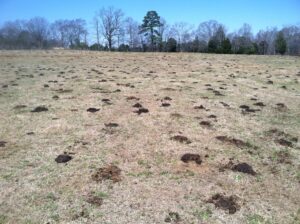
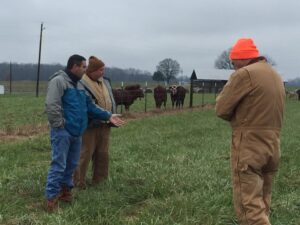
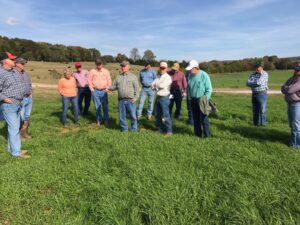
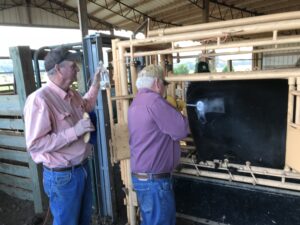
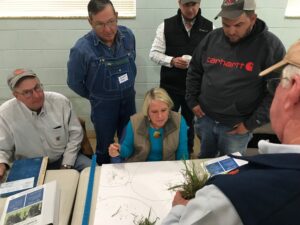

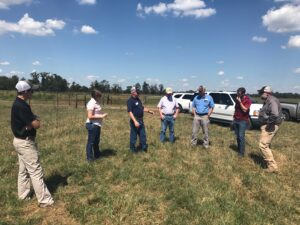
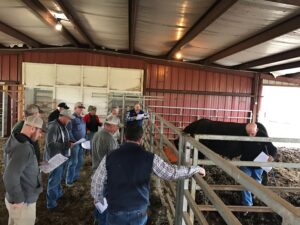
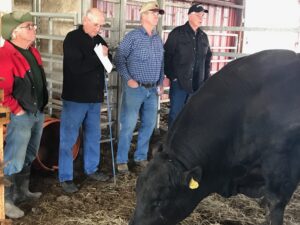
Educational & Outreach Activities
Participation summary:
Learning Outcomes
Project Outcomes
- There has been improved communication among Alabama Extension (Auburn and Alabama A&M universities) and USDA NRCS Alabama on shared curriculum resource development that can be used for stakeholder education since this project was started.
- There has been an increase in availability and reach of educational resources related to strategies for improving natural resource management in beef production systems. There have been 28 educational products developed as part of this grant including both web-based and printed resources that have created a library of systems-management resources for Alabama technical educators and farmers.
- A Qualtrics survey in fall 2017 noted a 38% increase in awareness about beef management systems educational resources created through this project. Among survey participants (n = 15; consisting of mostly regional extension agents), 100% indicated that they plan to use these resources in their educational programming efforts.
- The first Systems working group was implemented in fall 2016/spring 2017 and consisted of 24 beef farmers in northern Alabama. 30% of participants had started implementing one of more of the management topics discussed by the end of the program, and an additional 28% planned to implement one or more topics related to soils, forages, water, or animal management within the next year. A follow up survey will be conducted in 2018 with two farmers from this group to determine economic impact of long-term management practices that were a result of this program.
- Five Systems 360 working groups were initiated in fall 2018 with 83 participants statewide. Three of those groups have continued through completion of the developed Systems 360 curriculum. There was a 33% increase in knowledge associated with topics related to watering systems, animal and marketing management, forages and climate decisions. Program participants indicated that they learned the most from other producers in their respective discussion groups, followed by the opportunity to learn in an on-farm setting. This demonstrates the unique design of this program, and that it was an effective model for teaching producers sustainable beef cattle management practices. The total economic impact of this program to date is $69,750, or a total savings of $25/calf from the education received as part of this initiative.
Information Products
- Alabama Beef Herd Planning Calendar
- Systems 360 Discussion Group Curriculum - Forages
- Systems 360 Discussion Group Curriculum - Water
- Systems 360 Discussion Group Curriculum - Climate
- Systems 360 Discussion Group Curriculum - Economics
- Systems 360 Discussion Group Curriculum - Management
- Systems 360 Content Development Needs Assessment Data
- Alabama Beef Systems Management Handbook
- Systems 360 Agent Training Agenda
- Beef Systems - Sustainable Beef Management - Economics Part 1
- Beef Systems - Sustainable Beef Management Videos - Economics Part 2
- Beef Systems - Sustainable Beef Management Videos - Economics Part 3
- Beef Systems - Sustainable Beef Management Videos - Water Quality
- Beef Systems - Sustainable Beef Management Videos - Forage Management to Reduce Runoff
- Beef Systems - Sustainable Beef Management Video Series - Climate
- Systems 360 Discussion Group Curriculum - Forage Budget - Winter Annuals
- ANR-2435 Planning to Make a Cow-Calf Profit
- ANR-2381 Drinking Water for Livestock
- ANR-2436 Water Requirements of Beef Cattle
- ANR-0155 Forage Systems for Central Alabama
- ANR-2431 Forage Systems for Northern Alabama
- ANR-2432 Forage Systems for South Alabama
- ANR-2415 Beef Herd Management Strategies
- ANR-2284 A Systems Approach to Beef Production
- Systems 360 Discussion Group - Pilot Group Results - Poster
- Popular Press Article Introducing the Systems 360 Discussion Group Concept
- Animal Science and Forage Webinar Series